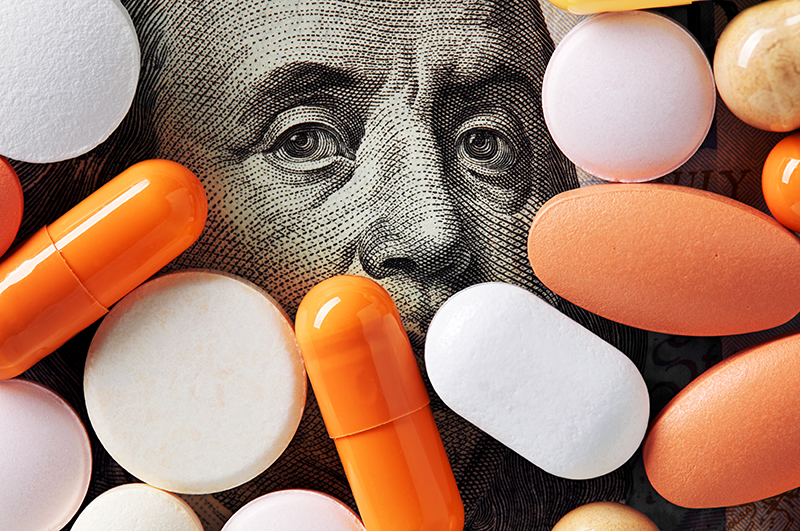Are You Over-Paying for Prescriptions & Healthcare in the U.S.? Absolutely!
Do you trust the government with your medical needs? How about the healthcare industry? We know those are loaded questions you may think about frequently or avoid at all costs when talking to friends and family. If you live in the United States, though, those are questions you likely identify with. Views on the subject of healthcare vary for many reasons, and often, which side of the political line you stand on is where you get most of your information on the subject and what shapes your individual views. Personal experience also plays a significant role in how someone feels about healthcare. The majority of bankruptcies filed each year are due to overwhelming medical bills. Those of us who struggle to pay our premiums for health insurance each month feel defeated. It’s difficult to go to the doctor and ask for help when you know you’ll be facing a bill you can’t pay. It’s this group that rallies around universal healthcare, or more specifically, Medicare for All. Where is our tax money going, how is it benefiting us? We are paying a sizeable portion of our paychecks to federal taxes, and yet every year, we pay more for healthcare. Healthcare that some of us never utilize out of fear of an enormous bill.

Modern medicine means we are successfully treating people for infections, diseases, chronic pain, and conditions across the board that people used to suffer and die from. But soaring healthcare and drug prices mean people living with HIV, diabetes, cancer, and a never-ending list of treatable ailments are forgoing treatment because they cannot afford it – or they’re digging themselves an incredible hole of debt to simply survive. When you read stories about someone with kidney disease in Canada or Australia being screened more frequently for preventable diseases, treated thoroughly and without delay when diagnosed, and receiving bills that can be easily paid by any individual or family regardless of income, it’s difficult to understand why the U.S. has not caught up to these countries on the healthcare level. Especially when you find out people in our country are paying more for insulin in a month than they are on rent.
BlueCross BlueShield has named three key factors driving U.S. healthcare costs that indicate glaring problems within our healthcare system. First is the rising price of prescription drugs. There are many prescription drugs that can help manage, cure, and even prevent various conditions and diseases, but regular taxpayers cannot afford these life-saving drugs. It will only become more difficult to get the prescription drugs you need as the prices continue to rise over the next few years. The second factor is chronic diseases like arthritis, obesity, cancer, heart disease, and the like. When you can’t afford healthcare, it’s easy to put off treatment for common and complex conditions. The costs to properly treat chronic diseases and conditions long term is already difficult to swallow; the prices soar when you’re late to the game on diagnosis, management, and treatment. The third factor is the unhealthy lifestyle of most Americans. We’ll get into the FDA’s role in the health of the American people on another day. Still, we will go ahead and state the obvious – the government (FDA) and companies that produce unhealthy foods and products, that are heavily marketed to people who will not question the impact these products have on their overall health, are more concerned with making money than helping consumers understand exactly what they are putting in their bodies.


It can be quite frustrating to be one of the little people. We hope the government officials we have elected to be our voice truly have our best interests at heart, but that’s hard to believe when influential members of congress are receiving money from big players in the pharmaceutical and healthcare industries. Money used to sway votes on policies related to drug pricing in a direction that benefits companies rather than individuals.
When drug prices increase, you can bet lobbying spending on Capitol Hill increases too. You’ll find a lot of that lobbying is against bills that will impact the ability of pharmaceutical companies to set their own drug prices without the government interfering with regulations. Citizens for Responsibility and Ethics in Washington put together a compelling report on how big pharma lobbies to keep prescription drug prices high.
So let’s lay out the facts. The pharmaceutical industry is making record profits in the U.S. They are spending more and more money in federal lobbying to keep the industry in charge of drug prices rather than the people (via elected representatives). More and more Americans struggle to pay for the prescription drugs and medical treatments they need to lead healthy, comfortable lives. Study after study says Medicare for All saves the U.S. money. And many other wealthy countries have successful universal healthcare systems in place. So why are the American people suffering from crippling medical debt? The simple answer is money and greed.











